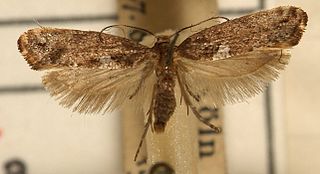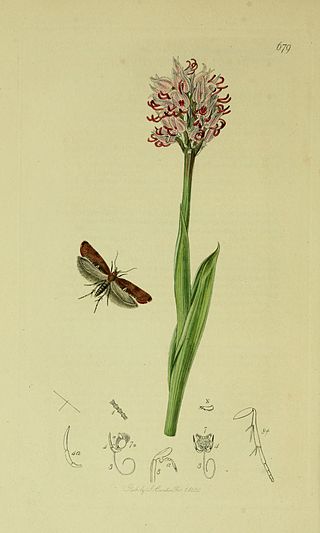
The Acrolepiidae are a family of moths known as false diamondback moths. In modern classifications, they are often treated as a subfamily (Acrolepiinae) of the family Glyphipterigidae.

The leek moth or onion leaf miner is a species of moth of family Acrolepiidae and the genus Acrolepiopsis. The species is native to Europe and Siberia, but is also found in North America, where it is an invasive species. While it was initially recorded in Hawaii, this was actually a misidentification of Acrolepiopsis sapporensis.

Acrolepiopsis is a genus of moths in the family Acrolepiidae.

Acrolepiopsis betulella is a moth of the family Acrolepiidae. It is found in most of central and western Europe. It was believed to be extinct in Great Britain, with 19th-century records from damp woodland in County Durham and Yorkshire and 20th-century records from Scotland, until a specimen was captured in County Durham in spring 2012.
Acrolepiopsis sapporensis is a moth of the family Acrolepiidae. It is native to Asia, where it is found from China and Mongolia to Russia, Korea and Japan. It is an introduced species in Hawaii, where it was initially misidentified as Acrolepiopsis assectella.
Acrolepiopsis mauli is a moth of the family Acrolepiidae that is endemic to Madeira.
Acrolepiopsis marcidella is a moth of the family Acrolepiidae. It is found in Great Britain, France, Spain, Portugal, Switzerland, Italy, Croatia and Bulgaria.
Acrolepiopsis ussurica is a moth of the family Acrolepiidae. It is found in China (Tianjin) and Russia.
Acrolepiopsis kostjuki is a moth of the family Acrolepiidae. It is found in China, Mongolia and Russia.
Acrolepiopsis postomacula is a moth of the family Acrolepiidae. It was described by Shōnen Matsumura in 1931. It is found in Japan
Acrolepiopsis suzukiella is a moth of the family Acrolepiidae. It was described by Shōnen Matsumura in 1931. It is found in Japan.
Acrolepiopsis leucoscia is a moth of the family Acrolepiidae. It was described by Edward Meyrick in 1927. It is found in the central United States, from Texas north to Illinois, Missouri and Ohio.
Acrolepiopsis californica is a moth of the family Acrolepiidae. It is found in western California, western Oregon and Alberta.
Acrolepiopsis heppneri is a moth of the family Acrolepiidae. It is found from Connecticut and New Hampshire in the east, south to Tennessee, Alabama and Mississippi, and west to Illinois.
Acrolepiopsis incertella is a moth of the family Acrolepiidae. It is found in the eastern half of North America, from southern Ontario to Florida and Mississippi in the south and to Illinois and Michigan in the west.
Acrolepiopsis chirapanthui is a moth of the family Acrolepiidae. It was described by Sigeru Moriuti in 1984. It is found in Thailand.
Acrolepiopsis issikiella is a moth of the family Acrolepiidae. It was described by Sigeru Moriuti in 1961. It is found in Japan.
Acrolepiopsis japonica is a moth of the family Acrolepiidae. It was described by Reinhard Gaedike in 1982. It is found in Japan.
Acrolepiopsis nagaimo is a moth of the family Acrolepiidae. It was described by Yasuda in 2000. It is found in Japan.
Acrolepiopsis sinjovi is a moth of the family Acrolepiidae. It was described by Reinhard Gaedike in 1994. It is found in Russia.


